Christ the Lord: Out of Egypt Read online
Page 3
"What you did," he whispered.
"Yes?"
"Killing Eleazer, bringing him back?"
"Yes?"
"Never, never do that again," he said.
"I know," I answered.
"Nazareth is a small place," he said.
"I know," I said.
He turned away.
I rolled over, my head on my arm. I closed my eyes. I stroked the head of Little Justus. Without waking he snuggled closer.
What did I know?
"Jerusalem," I whispered. "Where the Lord dwells in the Temple." No one heard me. Philo had told me, It is the biggest Temple in all the world. I saw the clay sparrows that I had made. I saw them spring into life, heard the flap of wings, heard my mother's breath, Joseph's cry: "No!" and they were gone, tiny dots against the sky. "Jerusalem." I saw Eleazer rise from the mat.
Philo had said on that day when he received me in his house that the Temple was so beautiful that thousands came to see it, thousands, pagans and Jews from all the cities of the Empire, men and women journeying there to offer sacrifice to the Lord of All.
My eyes snapped open. All around me the others slept.
What did I think had happened in all this? A great stumbling.
Where had that power come from? Was it still there?
Joseph hadn't spoken one word to me about it. My mother hadn't asked me what had happened. Had we ever talked of the sparrows made on the Sabbath?
No. No one would talk of these things. And I couldn't ask anyone, now, could I? To talk of such things outside the family, that could never happen. Any more than I could stay in the great city of Alexandria and study with Philo in his house of marble floors.
I must be very very watchful from now on, that even in the smallest things I might misuse what was inside me, this power that could make Eleazer die and come back to life.
Oh, it had been all very well to make everyone smile at my quickness at learning, Philo and the Teacher and the other boys, and I knew so much of the Scripture in Greek, and in Hebrew thanks to Joseph and Uncle Cleopas and Uncle Alphaeus, but this was different.
I knew something now that was beyond what I could put into words.
I wanted to go to Joseph, to wake him up, to ask him for help in understanding this. But I knew he'd tell me not to ask about this any more than I should ask about the other things, the things I'd heard them saying. Because this power, this
power was somehow linked to the things they'd been saying, and to the strange talk of the Teacher which had made them all go silent and look at him. It had to be linked.
It made me sad, so sad I wanted to cry. It was my fault we had to leave here. It was my fault, and even though everyone was happy, I felt sad and to blame.
All this was mine to keep inside. But I'd find out what had happened in Bethlehem. I'd find out some way, even though I had to do as Joseph said.
But for now, what was the very deep secret of all this? What was the inside of it? I must not misuse who I am.
A coldness came over me. I felt still and I felt very small. I pulled the blanket up around me. Sleepiness. It came as if an angel had touched me.
Better to sleep as all of them were sleeping. Better to drift as they drifted. Better to trust as they trusted. I stopped trying to stay awake and think on these things. I felt drowsy, so drowsy that I couldn't think anymore.
Cleopas was coughing again. Cleopas was going to be sick as he so often was. And that night I knew it would be bad. I heard the rattle down in his chest.
3
WITHIN DAYS THE NEWS ARRIVED in the port that Herod was dead. It was the talk of the Galileans and Judeans everywhere. How had Joseph known? The Teacher came storming back, demanding to know, but Joseph said nothing.
We were busy long hours completing the tasks we'd taken on, finishing doors, benches, lintels, and such that had to be leveled and smoothed, and finished, and then delivered to the painters. After that came the picking up of the items already painted and the putting of them into place in the houses of those who had hired us, which I liked because I saw many rooms, and different people, though we always worked with our heads down and our eyes down out of respect, but still I saw things. I learned things. And all this meant coming home after dark, tired and hungry.
It was more work than Joseph had thought but he didn't want to leave any promise unfulfilled, and meantime my mother wrote home to Old Sarah and her cousins that we were coming, James penning the letters for her and both of us taking them to the post, and all life was excited with preparations.
The spirit in the street was with us again now that everyone knew we were soon going. Other families gave us presents to take with us—small pottery lamps, and one a stoneware cup, and another a fine bit of linen.
It was almost resolved to go by land, with the purchase of donkeys planned, when Uncle Cleopas rose from his bed one night coughing badly and said:
"I don't want to die in the desert." He had become very pale, and thin, and had not been working much with us anymore, and this was all he had to say. No one answered him.
And so it was resolved, we would go by ship. It would cost us, everybody knew, but Joseph said we would do it. We would go to the old harbor of Jamnia. And we would reach Jerusalem in time for the Feast, and after that Cleopas slept better.
Then came time to leave. We were dressed in our finest woolen robes and sandals, everyone loaded with packs of goods. And it seemed the whole street turned out to see us off.
Tears were shed, and even Eleazer came to nod at me, and I at him, and then we were pressing our way through the thickest crowd I'd ever seen in the port, with my mother herding us together, and I clutching Salome's hand tight, and James telling us over and over to stay together. Over and over the heralds blew their trumpets for ships. And at last came the call for a ship to Jamnia, and then another, and another. Everywhere people were shouting and waving.
"Pilgrims," said Uncle Cleopas, laughing again the way he used to before he got sick. "The whole world's headed for Jerusalem."
"The whole world!" Little Salome shrieked. "Did you hear that?" she said to me.
I laughed with her.
We went pushing and shoving and clinging to our bundles with the men hollering and gesturing over our heads, the women cleaving together, and reaching out to snatch our arms and pull us in, and suddenly we were on the gangplank, very nearly falling into the murky water.
In all my life, I had never known such a thing as hitting the deck boards of this ship and as soon as the bundles had all been set down all together, and the women had climbed on top of them and faced each other with veils drawn, and James had given us his more serious and warning face, Salome and I dashed off and made for the rail of the ship, slipping under everyone to reach the point where we could see the port and all the other hurrying people who were still waving and disputing and carrying on, even though we were all but crushed by the bellies and backs against us.
We saw the plank drawn up, the ropes tossed aboard, the last sailor jumping onto the boat, and the water widen between us and the harbor, and suddenly there came that lurch as the boat moved out, and all aboard gave a loud shout, and we slipped away onto the belly of the sea and I squeezed Little Salome to myself, and we laughed for joy to feel the boat borne along beneath us.
We waved and hollered to people we didn't even know, and they waved back and I could feel the high spirits of everyone around me.
For moments, I thought Alexandria would disappear behind all her ships and their masts, but the farther out we moved, the more I could see the city, really see it as I'd never seen it, and a shadow passed over me, and if it hadn't been for Little Salome's happiness, I might not have been so happy too. But I was.
The wind picked up; the smell of the sea was suddenly clean and wonderful, and it caught at our hair and was cool on our faces. We were really leaving Egypt behind, and I wanted to break down and cry like a baby.
Then everyone was shouting for us to look
at the Great Lighthouse, as if we could not see it looming over us to the left.
Now many times, I'd looked out to sea at the Great Lighthouse.
But what was that to passing before it now?
Heads were turned, and people were pointing, and finally Salome and I had a good view of it. It stood on its own little island—a great torch reaching the sky. And we passed it as if it was a holy thing, wondering and murmuring.
The ship moved on, and what had seemed slow now seemed very fast, and the sea was tossing up and down, and there were cries from some of the women.
People began to sing hymns. The land grew ever more distant. The lighthouse became small and then disappeared.
The crowd of those looking broke up, and for the first time I turned and saw the sight of the giant square sail filled with the wind and the sailors working the ropes, and the whole scene of the men at the tillers and all the families now huddled around their bundles, and I knew we had better get back to our own who were no doubt missing us.
People were singing louder and louder, and soon one hymn gripped the whole crowd, and Little Salome and I joined in, but the wind came scurrying to take the words away.
We had to pick our way through the families to find our own, but at last we did, and there were my mother and my aunts trying to sew as if their veils weren't being almost torn from their heads, and my aunt Mary saying that Uncle Cleopas was feverish and he himself curled up and sleeping beneath a blanket tucked tight and missing everything.
Joseph was just a little apart, seated on one of the few trunks we had with us, quiet as he always was, staring at the blue sky, and the mast above the sail where there was a topsail, but my uncle Alphaeus was deep into arguing with other passengers on board about trouble ahead in Jerusalem.
Now James was all ears for this, and I was soon listening to it too, though I didn't dare move too close for fear they'd leave off if they noticed me. They were shouting against the growing wind, standing together, in a little space, fighting to keep their mantles from being blown off, shifting this way and that as the boat moved uneasily over the water.
At last, I had to hear what they were saying, and moved away towards them. Little Salome wanted to come, but her mother snatched her back, and I made a motion for her to wait, trying to tell her I'd come back to her.
"I tell you it's dangerous," one of the men said in Greek. He was a tall man with very dark skin and richly dressed. "I wouldn't be going to Jerusalem if I were you. For me it's home, and my wife and children are there. I have to get there. But I tell you, it's no time for all these pilgrim ships to be sailing."
"I want to be there," said the other, his Greek just as easy, though he was a rougher man. "I want to see what happens. I was there when Herod burnt alive both Matthias and Judas, two of the finest scholars of the Law we ever had." He nodded to both my uncles. "I want justice from Herod Archelaus. I want the men who served his father in this to be punished. How Archelaus handles this will argue for everything else."
I was amazed. I'd heard many bad things about King Herod. I didn't know a thing about the new Herod, his son, who was Archelaus.
Well, what does he tell the people?" asked my uncle Alphaeus. "He must tell them something."
My uncle Cleopas, having roused himself from the company of the women, suddenly joined in. "He probably tells
whatever lies he has to," he said as if he knew all about it. "He has to wait for Caesar to say whether he'll be King. He can't rule without Caesar confirming his crown. Nothing he says means anything anyway." My uncle gave one of his mocking laughs.
I wondered what they thought of him.
"He tells everyone to be patient, naturally," said the first man in his good Greek. It flowed easily like Greek did from our Teacher, or from Philo. "And he waits for Caesar's confirmation, yes, and he tells the people to wait. But the crowds don't even listen to his messengers. The crowds don't want patience right now. They want action. They want vengeance. And they just might get it."
This puzzled me.
"You have to realize," said the rough man, the more angry man, "that Caesar didn't know all the evil that old Herod did. How can Caesar know everything that goes on in the Empire? I tell you there has to be a reckoning for the things he did."
"Yes," said the tall one, "but not in Jerusalem at Passover, not when pilgrims have come from all over the Empire."
"Why not?" said the other, "why not when the whole world is there? Why not when the news will carry to Caesar that Herod Archelaus is not master of those who insist upon justice for the blood of those who were murdered?"
"But why did Herod burn alive the two teachers of the Law?" I asked. I did it suddenly, surprising myself.
At once Joseph turned from his thinking, though he was far away, and he looked over at me and then at the men.
But the taller one, the calm one, was already answering me.
"Because they pulled down the golden eagle Herod had put above the great Temple gate, that's why," he said calmly. "The Law says plainly there shall be no image of a living thing in our Temple. You are old enough to know that, child. Don't you know it? Just because Herod built the Temple did not mean he could put an image of a living thing in it. What was the point to labor rebuilding a magnificent temple so that he could transgress the law and put on its walls an image that was a desecration?"
I understood him though his words were not so simple to understand. I shivered.
"These men were Pharisees, teachers of the Law," the tall man went on, fixing me with his eye. "They led their pupils with them to take down the eagle. And Herod took their lives for this!"
Joseph was at my side.
The angry man said, "Don't take him away, let him learn. He would know the names of Matthias and Judas. Both these boys should know." He nodded to me and James. "It was the right and just thing to do. And they knew what a monster Herod was. Everyone knew. You in Alexandria, what did it have to do with you?" He looked at my uncles. "But for us, we lived with him and his monstrosities. They were visited on great and small, I tell you. Once on a whim, a mad whim, fearing a new King had been born, a Son of David, he sent his soldiers two miles' walk from Jerusalem to the town of Bethlehem and ..."
"No more!" Joseph said, though he smiled and nodded as he put up his hand.
He drew me away. Quickly and firmly, he brought me towards the women. James he allowed to stay there.
The wind swallowed up all their words. But what happened in Bethlehem?" I asked him.
"You'll hear stories about Herod's deeds all your life," Joseph said under his breath. "Remember, I told you that there were some questions that I didn't want for you to ask."
"Will we still go to Jerusalem?"
Joseph didn't answer. "Go there, and sit with your mother and the children," he said.
I did what he said.
The wind was blowing hard now and the boat was heaving. I felt a little sick. I was getting a little cold.
Little Salome was waiting to question me. I snuggled in between her and my mother. It was warm here and I felt better.
Joses and Symeon were already asleep in their lumpy bed among the bundles. Silas and Levi were huddled together with Eli, who was the nephew of Aunt Mary of Uncle Cleopas, who had come to live with us. They were pointing to the sail and to the rig.
"What were they saying?" Salome wanted to know.
"Trouble in Jerusalem," I said. "I hope we go," I said. "I want to see it." I thought of all the words I'd heard. I said excitedly, "Salome, just think of it, people from all over the Empire are going to Jerusalem."
"Yes, I know," she said. "It's the best thing we've ever done."
"Yes," I said with a big sigh. "I hope Nazareth is a fine place as well."
My mother sighed and threw back her head.
"Yes, you must see Jerusalem first," she said sadly. "As for Nazareth, it is the will of God it seems."
"Is it a big town?" asked Little Salome.
"Not a town at
all," my mother said.
"No?" I asked.
"A village," she said. "But it was once visited by an angel."
"People say that?" Little Salome asked. "That an angel came to Nazareth? It really happened?"
"No, people don't say it," said my mother, "but I know it."
She went quiet. It was her way. To say small things, and nothing more. After that, she wouldn't say anything even though we asked her over and over again.
My uncle Cleopas came back, sick and coughing, and lay down and my aunt covered him and patted him.
He heard us talking about angels in Nazareth—saying that we hoped we would see them—and he began his not so secret laughing.
"My mother says Nazareth was once visited by an angel," I told him. I knew that he just might tell us something. "My mother says she knows this." And his laughter only ran on as he curled up to sleep.

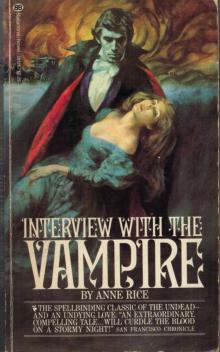 Interview with the Vampire
Interview with the Vampire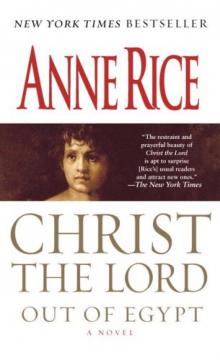 Christ the Lord: Out of Egypt
Christ the Lord: Out of Egypt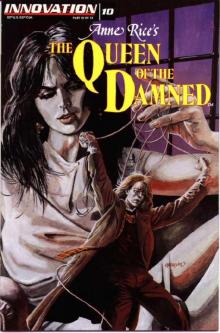 The Queen Of The Damned
The Queen Of The Damned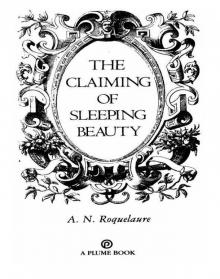 The Claiming of Sleeping Beauty
The Claiming of Sleeping Beauty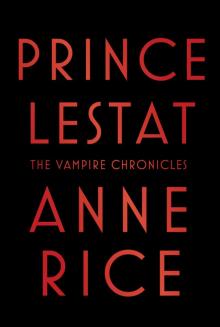 Prince Lestat
Prince Lestat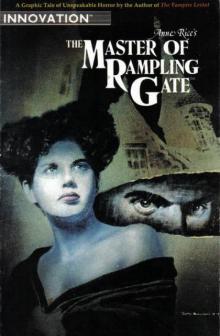 The Master of Rampling Gate
The Master of Rampling Gate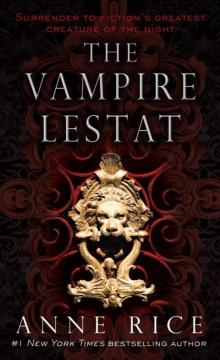 The Vampire Lestat
The Vampire Lestat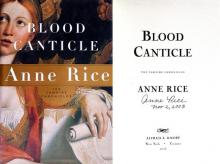 Blood Canticle
Blood Canticle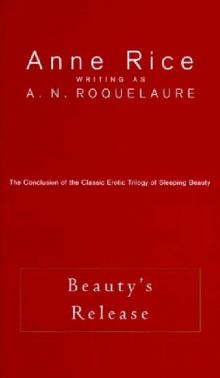 Beauty's Release
Beauty's Release Pandora
Pandora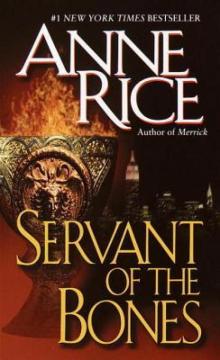 Servant of the Bones
Servant of the Bones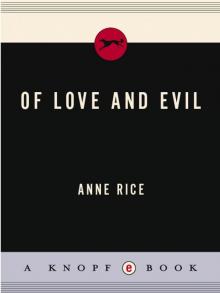 Of Love and Evil
Of Love and Evil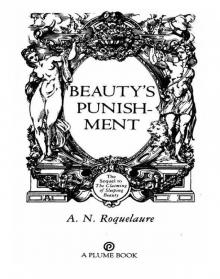 Beauty's Punishment
Beauty's Punishment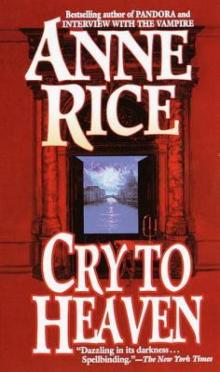 Cry to Heaven
Cry to Heaven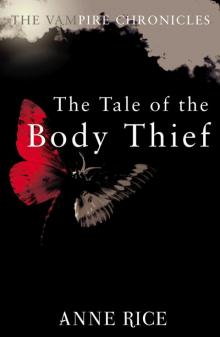 The Tale of the Body Thief
The Tale of the Body Thief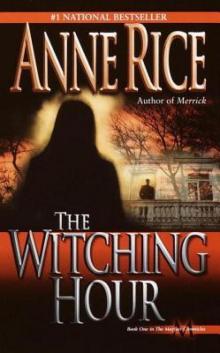 The Witching Hour
The Witching Hour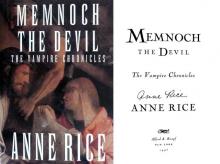 Memnoch the Devil
Memnoch the Devil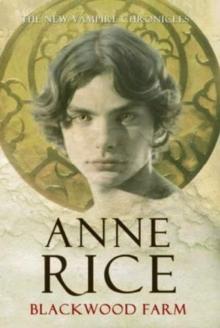 Blackwood Farm
Blackwood Farm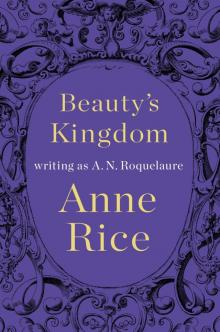 Beauty's Kingdom
Beauty's Kingdom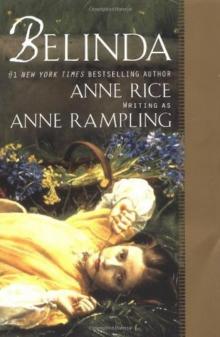 Belinda
Belinda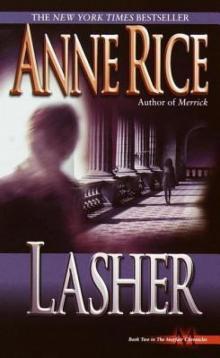 Lasher
Lasher Vittorio, the Vampire
Vittorio, the Vampire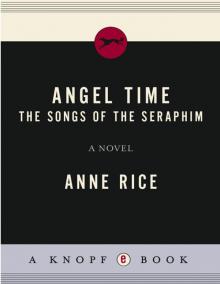 Angel Time
Angel Time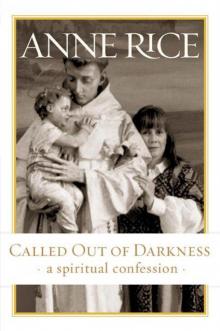 Called Out of Darkness: A Spiritual Confession
Called Out of Darkness: A Spiritual Confession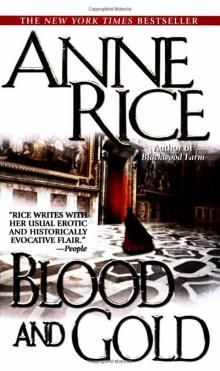 Blood And Gold
Blood And Gold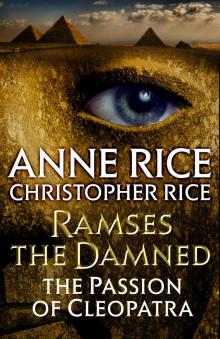 The Passion of Cleopatra
The Passion of Cleopatra Taltos
Taltos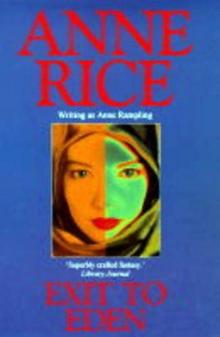 Exit to Eden
Exit to Eden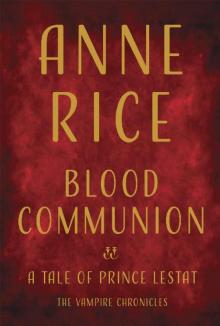 Blood Communion (The Vampire Chronicles #13)
Blood Communion (The Vampire Chronicles #13) The Wolf Gift
The Wolf Gift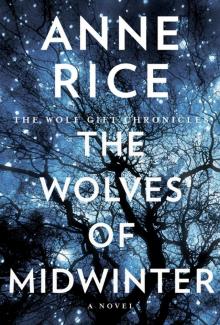 The Wolves of Midwinter
The Wolves of Midwinter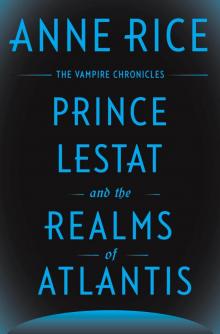 Prince Lestat and the Realms of Atlantis
Prince Lestat and the Realms of Atlantis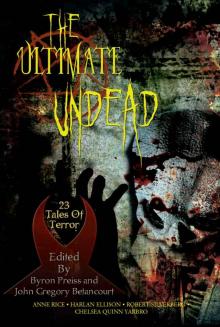 The Ultimate Undead
The Ultimate Undead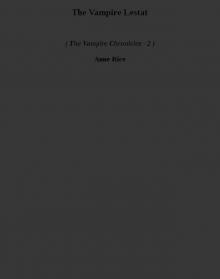 The Vampire Lestat tvc-2
The Vampire Lestat tvc-2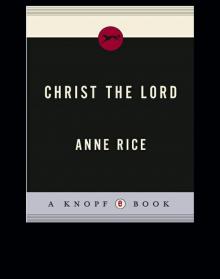 The Road to Cana
The Road to Cana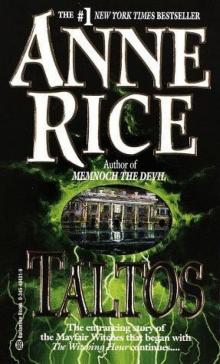 Taltos lotmw-3
Taltos lotmw-3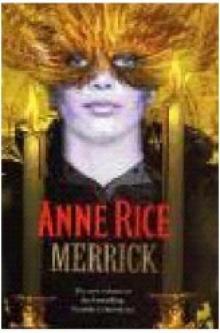 Merrick tvc-7
Merrick tvc-7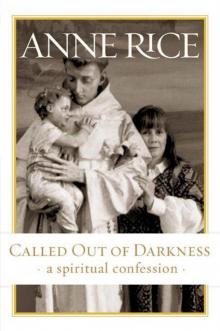 Called Out of Darkness
Called Out of Darkness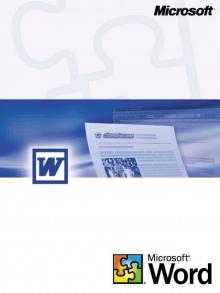 Pandora - New Vampires 01
Pandora - New Vampires 01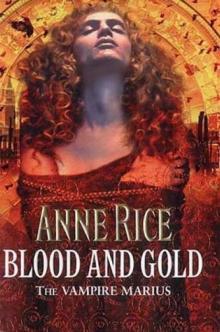 Bllod and Gold
Bllod and Gold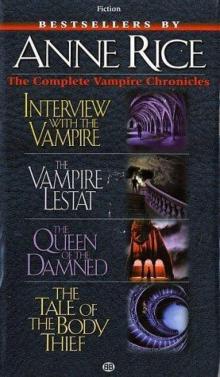 The Queen Of the Damned: Vampire Chronicles
The Queen Of the Damned: Vampire Chronicles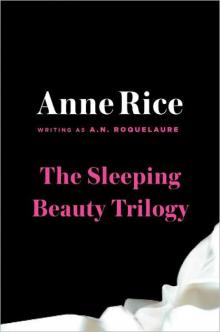 The Sleeping Beauty Trilogy
The Sleeping Beauty Trilogy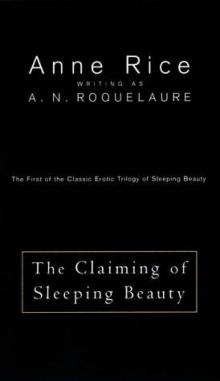 The Claiming of Sleeping Beauty b-1
The Claiming of Sleeping Beauty b-1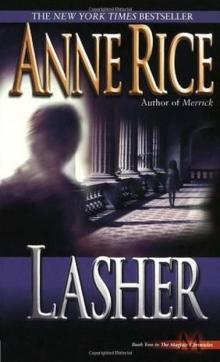 Lasher lotmw-2
Lasher lotmw-2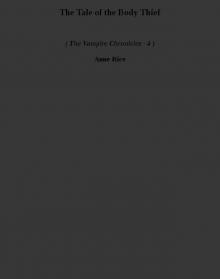 The Tale of the Body Thief tvc-4
The Tale of the Body Thief tvc-4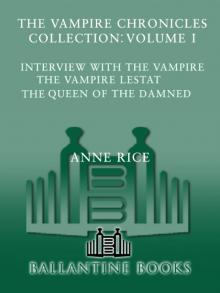 The Vampire Chronicles Collection
The Vampire Chronicles Collection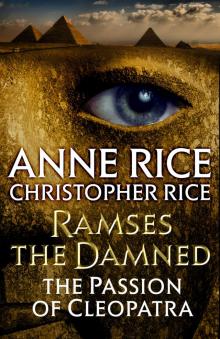 Ramses the Damned
Ramses the Damned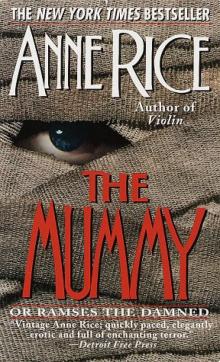 The Mummy - or Ramses the Damned
The Mummy - or Ramses the Damned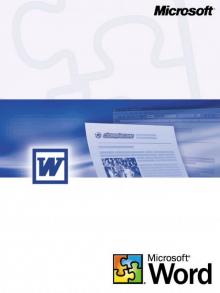 Vittorio, The Vampire - New Vampires 02
Vittorio, The Vampire - New Vampires 02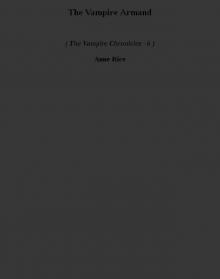 The Vampire Armand tvc-6
The Vampire Armand tvc-6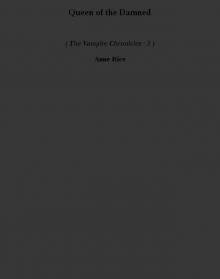 Queen of the Damned tvc-3
Queen of the Damned tvc-3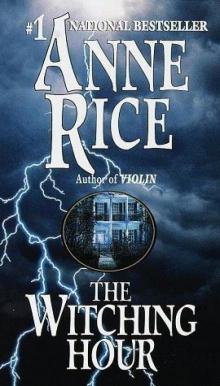 The witching hour lotmw-1
The witching hour lotmw-1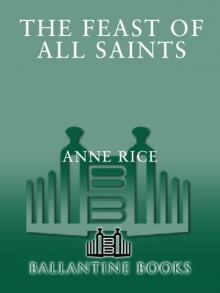 Feast of All Saints
Feast of All Saints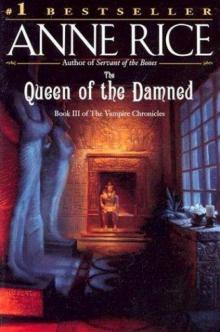 Queen of the Damned
Queen of the Damned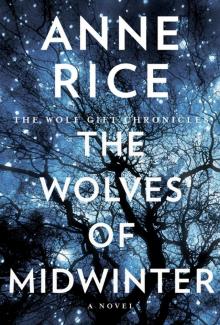 The Wolves of Midwinter twgc-2
The Wolves of Midwinter twgc-2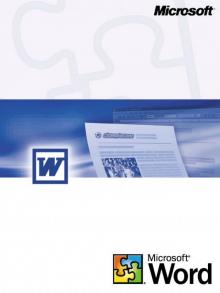 The Mummy
The Mummy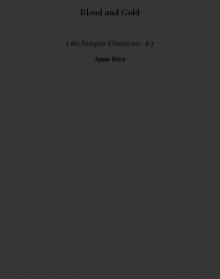 Blood and Gold tvc-8
Blood and Gold tvc-8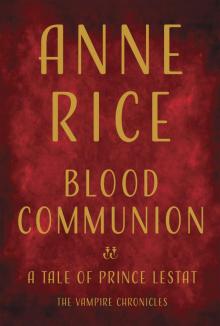 Blood Communion
Blood Communion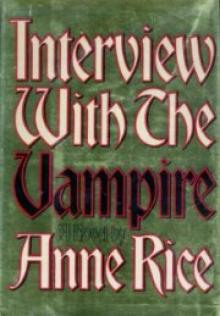 Interview with the Vampire tvc-1
Interview with the Vampire tvc-1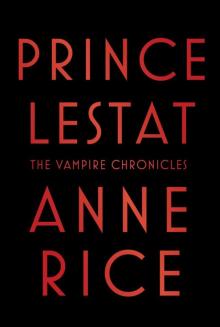 Prince Lestat: The Vampire Chronicles
Prince Lestat: The Vampire Chronicles